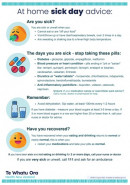Eplerenone
Sounds like 'ep-leer-en-own'
Key points about eplerenone
- Eplerenone is used together with other medicines to treat and prevent worsening heart failure.
- Eplerenone is also called Inspra.
- Find out how to take it safely and possible side effects.

Eplerenone is used together with other medicines to treat and prevent worsening heart failure. Heart failure means that your heart is not functioning as well as it should and can't pump enough blood to your organs. This causes shortness of breath, swelling in your feet or ankles, or tiredness. Eplerenone also works as a diuretic, which means it helps your body get rid of extra salt (sodium) and water. Read more about heart failure.
In Aotearoa New Zealand eplerenone is available as tablets (25 mg and 50 mg).
- The usual starting dose of eplerenone is 25 mg once a day.
- Your doctor may increase your dose to 50 mg once a day.
- Always take your eplerenone exactly as your healthcare provider has told you. The pharmacy label on your medicine will tell you how much to take, how often to take it and any special instructions.
- Treatment with eplerenone is usually long-term, so keep taking it regularly.
- Timing: Take eplerenone once a day, in the morning. Swallow the tablets whole with a drink of water. You can take eplerenone with or without food.
- Limit or avoid alcohol while taking eplerenone: Alcohol may increase your chance of side effects such as dizziness.
- Missed dose: If you forget to take your dose, take it as soon as you remember that day. If it's nearly time (less than 12 hours) for your next dose, skip the missed dose and take your next dose at the usual time. Don't take 2 doses at the same time.
Tests and monitoring
Your doctor will arrange for you to have blood tests during treatment with eplerenone. This is to check how it's working and to monitor your kidneys and potassium levels. Your dose may change depending on the level of potassium in your blood. If your blood test shows you have too much potassium in your blood, your doctor may reduce the dose or they may ask you to stop taking eplerenone for a short time.
Be aware of foods that affect potassium
Eplerenone can cause an increase in potassium in your blood. Having too much potassium in your blood can be dangerous, as it can affect your muscles and heart. Some foods and drinks can make this worse.
It’s important to:
- Limit foods and drinks that contains a lot of potassium such as bananas, avocados, legumes, nuts and fruit or vegetable juices. Your doctor or dietitian can help you plan a low potassium diet. Read more about which foods and drinks contain potassium.
- Avoid low-sodium salt or salt substitutes, such as Lo-Salt, because they contain a lot of potassium. Using these with eplerenone can cause very high potassium levels.
Tell your healthcare team if you are taking any other medicines
Eplerenone may interact with some medicines and herbal supplements, so check with your prescriber or pharmacist before starting eplerenone and before starting any new medicines or herbal supplements.
Be careful when taking pain relief medicines
Pain relief medicines called non-steroidal anti-inflammatory pain relief medication (NSAIDs) must be avoided if you have heart failure, as these medicines can make your condition worse. Taking eplerenone with NSAIDs can be very harmful to your kidneys and can cause acute kidney injury. Ask your doctor or pharmacist for a safer pain relief option.
Examples of NSAIDs are:
- ibuprofen (Brufen, I-Profen, Nurofen, Maxigesic, Nurofen Cold and Flu, Nuromol)
- diclofenac (Voltaren, Diclohexal)
- naproxen (Noflam, Naprosyn SR)
- mefenamic acid (Ponstan)
- celecoxib (Celebrex).
Have a sick day plan
If you have diarrhoea (runny poo) or you're vomiting (being sick) from a stomach bug, or you're at risk of dehydration for another reason, it’s important to let your doctor know. They may advise you to stop taking eplerenone for a few days and restart it when you feel better. Eplerenone can increase potassium in your blood, which is worse if you are dehydrated.
Like all medicines, eplerenone can cause side effects, although not everyone gets them. Often side effects improve as your body gets used to the new medicine.
| Side effects | What should I do? |
|---|---|
|
|
|
|
|
|
|
|
|
|
Read more about medicines and side effects and reporting a reaction you think might be a side effect. |
|
The following links provide further information on eplerenone:
Eplerenone(external link) NZ Formulary Patient Information te reo Māori(external link)
Inspra(external link) Medsafe Consumer Information Sheets, NZ
Heart failure medicines(external link) SafeRx, Health New Zealand | Te Whatu Ora, Waitematā NZ, 2016 English(external link), Chinese(external link), Korean(external link), Samoan(external link),
Brochures
Medicines and side effects [PDF, 91 KB] Healthify He Puna Waiora, NZ, 2024
5 questions to ask about your medications(external link) Health Quality and Safety Commission, NZ, 2019 English(external link), te reo Māori(external link)
At home sick day advice(external link) Health New Zealand | Te Whatu Ora
References
- Eplerenone(external link) NZ Formulary
Brochures

Medicines and side effects
Healthify He Puna Waiora, NZ, 2024

At home sick day advice
Health New Zealand | Te Whatu Ora, 2023

Health Quality and Safety Commission, NZ, 2019 English, te reo Māori
Credits: Sandra Ponen, Pharmacist, Healthify He Puna Waiora. Healthify is brought to you by Health Navigator Charitable Trust.
Reviewed by: Johanna Lim, Clinical Pharmacist – Cardiology Expert, Health New Zealand | Te Whatu Ora Te Matau a Māui Hawke’s Bay; Angela Lambie, Pharmacist, Auckland
Last reviewed:





